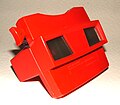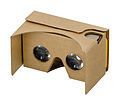电子游戏/VR的历史
虽然不是故事的主要内容,但模拟现实出现在古希腊哲学家柏拉图的《洞穴寓言》中[1][2][3],大约在公元前 360 年[4]。虽然不是我们今天所知的 VR,但这个故事不仅表明模拟现实的概念早于多媒体技术的诞生,而且还对人们数千年后会问及的关于虚拟世界成瘾的伦理问题有着惊人的理解[5][6]。类似的概念也存在于庄子的道教经典《逍遥游》中,这是一种公元前三世纪的中国古文,尽管模拟方法和故事的教训大不相同[7]。
简单的立体显示器试图从 1838 年在英国发明立体镜开始提供身临其境的体验[8][9]。苏格兰物理学家大卫·布鲁斯特爵士在光学方面很有建树,此前曾发明万花筒等物品,并制作了一种更精致、更便携的立体镜[10][11]。
在 1950 年代和 1960 年代,人们尝试创造更加身临其境的体验[12]。
在冷战期间,政府和商业机构进行了大量的研发工作,这为后来的消费者带来了副作用,即虚拟现实,以及计算领域的普遍进步。在这段时间里,人们进行了一系列营销尝试来推广这项技术[13]。尽管这项技术在 1980 年代和 1990 年代还没有在消费者中普及,但它为数十年后的通用游戏技术奠定了基础。
到 1992 年,纽约市开设了一家 VR 高尔夫中心,芝加哥开设了一家 VR 机械游戏厅[14]。
2010 年代初期,人们对 VR 的兴趣重新燃起,众筹平台提供了资金来推动发展[15][16]。2010 年代中期,大型企业开始在 VR、AR 和 MR 领域推出自己的产品[17][18][19]。
VR 技术在此期间成为科幻小说的热门主题,VR 游戏经常被非游戏媒体用作情节装置,将角色带到另一个世界,使用更具科学可信性的技术。2010 年代流行的虚构故事,例如 厄内斯特·克莱恩 2011 年的小说《头号玩家》和 史蒂文·斯皮尔伯格 2018 年的同名电影[20] 以及《刀剑神域》[21],在他们的故事中都以 VR 为主要特征。这些虚构作品反过来影响了这段时间 VR 内容创作者,他们努力将虚构内容带入虚拟现实[22][23]。
大约在 2016 年和 2017 年,媒体开始频繁表达对 VR 安全性的担忧[24][25]。
到 2021 年,大约五分之一的 Facebook 员工都在从事与他们的 VR 平台相关的工作[26][27]。
人们对 VR 的兴趣激发了降低 VR 体验准入门槛的兴趣。
- ↑ "现代诠释柏拉图洞穴寓言,探究3D现实的局限性" (in en). www.vice.com. https://www.vice.com/en/article/78e3xa/platos-cave-allegory-video-with-3d-quantum-mechanics.
- ↑ Kane, Pat. "逃离未来与虚拟现实". New Scientist. https://www.newscientist.com/article/2138305-escape-to-the-future-with-virtual-reality/.
- ↑ "虚拟现实的希望与失望". Literary Hub. 2017年11月28日. https://lithub.com/the-promise-and-disappointment-of-virtual-reality/.
- ↑ "皇后区社区学院". www.qcc.cuny.edu. Retrieved 2020年12月18日.
- ↑ Johansson, Anna (2018年4月17日). "VR 的 9 个伦理问题,我们仍需解决" (in en-us). The Next Web. https://thenextweb.com/contributors/2018/04/18/9-ethical-problems-vr-still-solve/.
- ↑ "洞穴寓言故事" (in english). Destructoid. https://www.destructoid.com/stories/allegory-of-the-cave-story-193555.phtml.
- ↑ "庄子的蝴蝶梦,去中心化". Retrieved 2020年12月18日.
- ↑ "虚拟现实的历史". The Franklin Institute. 2016年10月21日. Retrieved 2020年11月27日.
- ↑ Thompson, Clive. "立体照片是最初的虚拟现实". Smithsonian Magazine. Retrieved 2020年11月27日.
- ↑ "分子表达式:科学,光学与你 - 时间线 - 大卫·布鲁斯特爵士". micro.magnet.fsu.edu. Retrieved 2020年11月27日.
- ↑ "180年的3D". Retrieved 2020年11月27日.
- ↑ "虚拟现实的历史". The Franklin Institute. 2016年10月21日. Retrieved 2020年12月18日.
- ↑ "80年代和90年代古怪的VR世界". PCMAG. Retrieved 2020年11月25日.
- ↑ "近乎现实 - 看看虚拟现实". www.gamezero.com. Retrieved 2020年11月21日.
- ↑ "虚拟现实的兴衰和复兴". The Verge. Retrieved 2020年11月28日.
- ↑ "Oculus 以免费头显回应 Kickstarter 评论". the Guardian. 2016年1月6日. Retrieved 2020年11月28日.
- ↑ Manjoo, Farhad (2015 年 1 月 22 日). "Microsoft HoloLens: A Sensational Vision of the PC's Future (Published 2015)". 纽约时报. 检索于 2020 年 11 月 28 日.
- ↑ Miller, Claire Cain (2014 年 4 月 8 日). "At Google, Bid to Put Its Glasses to Work (Published 2014)". 纽约时报. 检索于 2020 年 11 月 28 日.
- ↑ "Facebook's $2 Billion Acquisition Of Oculus Closes, Now Official". TechCrunch. 检索于 2020 年 11 月 28 日.
- ↑ Roettgers, Janko (2018 年 3 月 29 日). "How ‘Ready Player One’ Compares to Today’s VR Technology". 综艺. https://variety.com/2018/digital/news/ready-player-one-vr-tech-1202739419/.
- ↑ "Manga Books - Best Sellers - Books - April 27, 2014 - The New York Times". 纽约时报. https://www.nytimes.com/books/best-sellers/2014/04/27/manga/.
- ↑ "Ernest Cline talks Ready Player One, Spielberg, and the future of VR" (in en). 独立报. 2018 年 3 月 30 日. https://www.independent.co.uk/arts-entertainment/films/features/ready-player-one-ernest-cline-interview-steven-spielberg-virtual-reality-vr-a8277996.html.
- ↑ Lang, Ben (2017 年 6 月 4 日). "Taking After 'Sword Art Online', Oculus Founder Wants to Make a VR Game With Serious Consequences". 通往 VR 之路. https://www.roadtovr.com/oculus-founder-wants-to-make-vr-game-with-serious-consequences-permadeath-sword-art-online/.
- ↑ Stein, Scott. "The real dangers of virtual reality" (in en). CNET. https://www.cnet.com/news/the-dangers-of-virtual-reality/.
- ↑ CNN, By Sandee LaMotte (2017 年 12 月 13 日). "The very real health dangers of virtual reality" (in en). CNN. https://www.cnn.com/2017/12/13/health/virtual-reality-vr-dangers-safety.
- ↑ "Facebook Now Has 10,000 People Working on VR and AR Devices". MUO. 2021 年 3 月 12 日. https://www.makeuseof.com/facebook-ar-vr-development/.
- ↑ Byford, Sam (2021 年 3 月 12 日). "Almost a fifth of Facebook employees are now working on VR and AR: report" (in en). The Verge. https://www.theverge.com/2021/3/12/22326875/facebook-reality-labs-ar-vr-headcount-report.






























